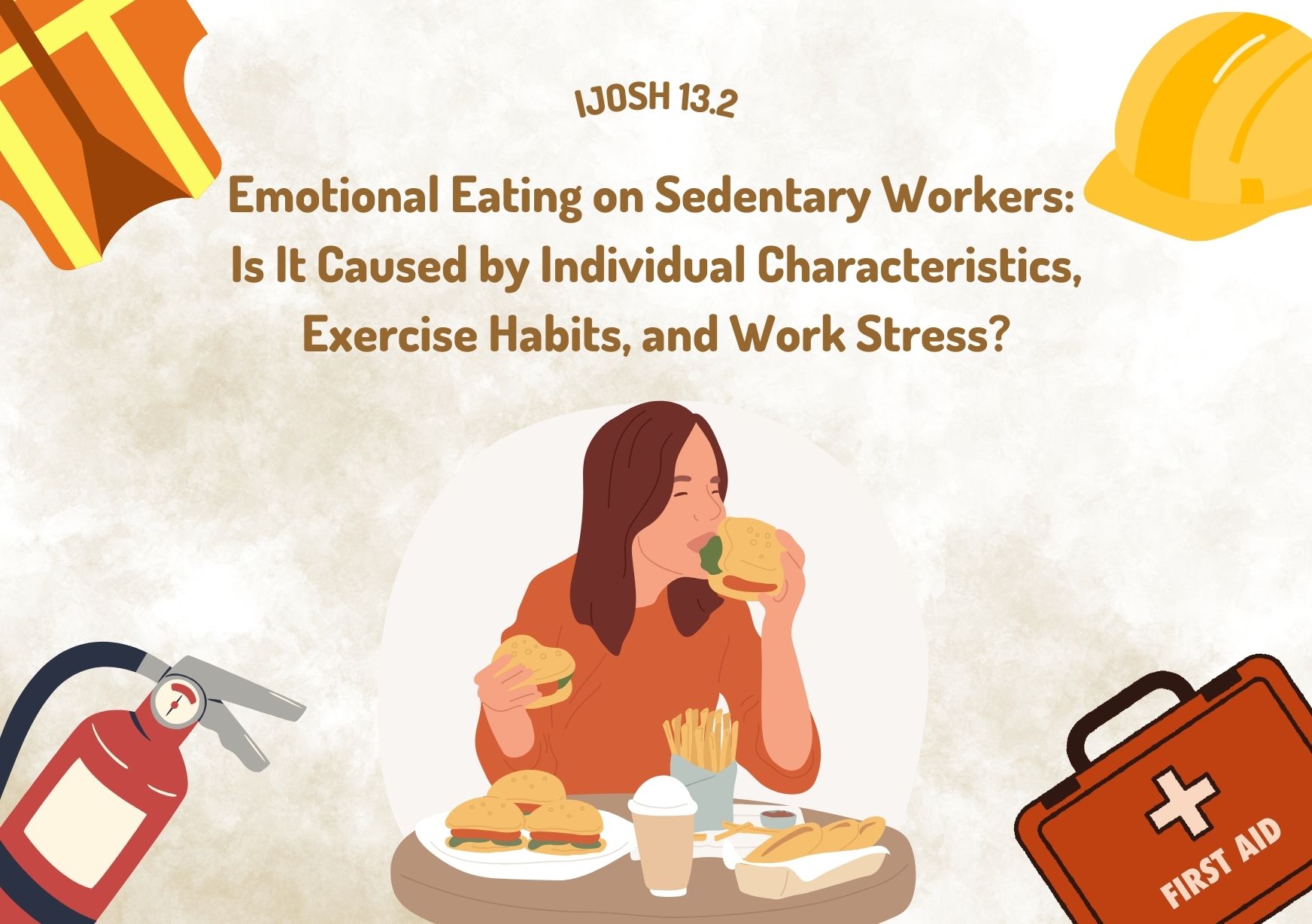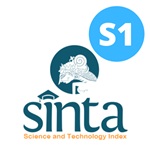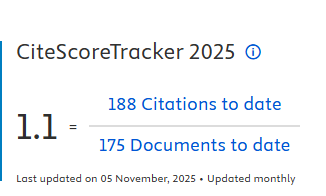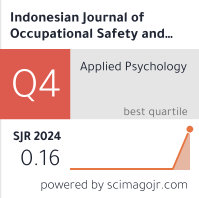Emotional Eating on Sedentary Workers: Is It Caused by Individual Characteristics, Exercise Habits, and Work Stress?

Introduction:Emotional eating is a person's response to stress or inadequate and ineffective stress coping and is shown by the behavior of eating more than needed and is associated with increased body weight. Emotional eating is caused by age, gender, exercise habits, and work stress. Based on the observations carried out at Kalla Group Office, employees tend to work in a monotonous and static manner that has the potential to increase the risk of emotional eating. The aim of this research is to determine the strength and weakness of the correlation between age, gender, exercise habits, and work stress with emotional eating in Kalla Head Office workers. Methods: This quantitative research was carried out through analytical observational design. The number of samples taken is 133 people using purposive sampling. In this case, the independent variables measured are age, gender, exercise habits, and work stress. Meanwhile, the dependent variable studied is the level of emotional eating using "The Dutch Eating Behavior Questionnaire of 13 items (DEBQ-13)". Data were further analyzed using Spearman correlation coefficient test (Spearman rho). Results: The research results show varied relationship with the independent variables including age (r = 0.052), gender (r = 0.251), exercise habits (r = -0.128), and stress (r = 0.048). Conclusion: Age is a variable that has the weakest relationship, while gender has the strongest relationship with emotional eating compared to the variables exercise habits and work stress.
Agusti, S., Ifdil, I. and Amalianita, B. (2022) ‘Analysis of Final Student Quarterlife Crisis based on Gender’, Journal of Konselor, 11(2), pp. 36–42.
Alkhawaldeh, A., et al. (2023) ‘Stress Factors, Stress Levels, and Coping Mechanisms among University Students’, The Scientific World Journal, pp. 1–9. https://doi.org/10.1155/2023/2026971
Ambarwati, P.D., Pinilih, S.S. and Astuti, R.T. (2019) ‘Gambaran Tingkat Stres Mahasiswa’, Jurnal Keperawatan Jiwa, 5(1), p. 40. https://doi.org/10.26714/jkj.5.1.2017.40-47
Amrynia, S.U. and Prameswari, G.N. (2022) ‘Hubungan Pola Makan, Sedentary Lifestyle, dan Durasi Tidur dengan Kejadian Gizi Lebih Pada Remaja (Studi Kasus di SMA Negeri 1 Demak)’, Indonesian Journal of Public Health and Nutrition, 2(1), pp. 112–121. https://doi.org/10.15294/ijphn.v2i1.52044
Andalasari, R. and Berbudi Bl, A. (2018) ‘Kebiasaan Olah Raga Berpengaruh Terhadap Tingkat Stress Mahasiswa Poltekkes Kemenkes Jakarta’, Jurnal Ilmu dan Teknologi Kesehatan, 5(2), pp. 179–191. https://doi.org/10.32668/jitek.v5i2.11
Annisa, S.R. and Zahra, A.S.A. (2021) ‘Hubungan Antara Emotional Eating dengan Penambahan Body Mass Index di Masa Pandemi Covid-19’, Seminar Nasional Kesehatan Masyarakat UPNVJ, 2(1), pp. 1-8
Asih, G.Y., Widhiastuti, H. and Dewi, R. (2018) Stres Kerja. Semarang: Semarang University Press.
Ayuningtyas, D., Misnaniarti, M. and Rayhani, M. (2018) ‘Analisis Situasi Kesehatan Mental Pada Masyarakat Di Indonesia Dan Strategi Penanggulangannya’, Jurnal Ilmu Kesehatan Masyarakat, 9(1), pp. 1-10. https://doi.org/10.26553/jikm.2018.9.1.1-10
Bayu, W.I., Usra, M., Giartama, G., Solahuddin, S. and Yusfi, H. (2022) ‘Tingkat stress calon guru pendidikan jasmani selama pandemi covid-19’, Journal Of Sport Education (JOPE), 4(2), pp. 87-96. https://doi.org/10.31258/jope.4.2.87-96
Bhastary, M.D. (2020) ‘Pengaruh Etika Kerja dan Stres Kerja Terhadap Kepuasan Kerja Karyawan’, MANEGGGIO: Jurnal Ilmiah Magister Manajemen, 3(2), pp. 160-170.
Bull, F.C., et al. (2020) ‘World Health Organization 2020 Guidelines on Physical Activity and Sedentary Behaviour’, British Journal of Sports Medicine, 54(24), pp. 1451–1462. https://doi.org/10.1136/bjsports-2020-102955
Flora, R., Zulkarnain, M., and Sukirno (2020) ‘β-endorphin Response to Aerobic and Anaerobic Exercises in Wistar Male Rats’, Medical Journal of Indonesia, 29(3), pp. 245–9. https://doi.org/10.13181/mji.oa.203569
Goma, E.I., Sandy, A.T. and Zakaria, M. (2021) ‘Analisis Distribusi dan Interpretasi Data Penduduk Usia Produktif Indonesia Tahun 2020’, Jurnal Georafflesia: Artikel Ilmiah Pendidikan Geografi, 6(1), p. 20. https://doi.org/10.32663/georaf.v6i1.1781
Graves, B.S., et al. (2021) ‘Gender Differences in Perceived Stress and Coping among College Students’, PLOS ONE. 16(8), p. e0255634. https://doi.org/10.1371/journal.pone.0255634
Hammami, A., et al.(2022) ‘Physical Activity and Coronavirus Disease 2019 (COVID-19): Specific Recommendations for Home-based Physical Training’, Managing Sport and Leisure, 27(1–2), pp. 26–31. https://doi.org/10.1080/23750472.2020.1757494
Kamilah, S.N., et al. (2022) ‘Pemeriksaan Status Gizi berdasarkan Nilai Indeks Massa Tubuh pada Anak Usia 10-12 Tahun di SDN 159 Bengkulu Utara’, Indonesian Journal of Community Empowerment and Service (ICOMES), 2(2), pp. 95–100.
Kemenkes RI (2022) Tingkatkan Lansia Produktif Melalui Transformasi Layanan Primer. Jakarta: kemenkes RI.
Liu, Y., Wang, Z. and You, S. (2021) ‘The Mediating Effect of Coping Style on Physical Activity and Negative Affect Caused by Public Health Emergencies: Evidence from Chinese College Students’, International Journal of Environmental Research and Public Health, 18(22), p. 12086. https://doi.org/10.3390/ijerph182212086
Maryatun, S. (2020) ‘Pengaruh Spiritual Emotional Freedom Technique dan Supportive Therapy terhadap Tingkat Stres Pasien Kanker Serviks’, Jurnal Keperawatan Sriwijaya, 7(1), pp. 14–25. https://doi.org/10.32539/JKS.v7i1.12220
Nurwahidah, A., Rohmah, R. and Hilwa, A. (2022) ‘Hubungan Koping Stres dengan Perilaku Makan pada Usia Dewasa Awal yang Mengalami Stres’, Jurnal Psikologi Bertalenta, 2(1), pp. 69–78.
Pambudi, D.S., et al. (2021) ‘Kemampuan Komunikasi Matematis Siswa SMP dalam Matematika Nalaria berdasarkan Jenis Kelamin’, JNPM (Jurnal Nasional Pendidikan Matematika), 5(1), p. 136. https://doi.org/10.33603/jnpm.v5i1.4206
Putri, N.P.A.W. and Sundari. L.P.R.. (2019) ‘Hubungan Antara Aktivitas Bermain Game Online Dengan Kebugaran Fisik Pada Remaja SMP Di Kota Denpasar’, Jurnal Medika Udayana, 8(7).
Putri, F.R.O., Faizal, D. and Adha, M.Z. (2022) ‘Analisis Determinan Gangguan Muskuloskeletal Di Kantor Kesehatan Pelabuhan Kelas II Banten’, Frame of Health Journal, 1(1), pp. 66-79.
Rahmah, F.Y. and Priyanti, D. (2019) ‘Gambaran Emotional Eating Pada Mahasiswa Pengguna Aplikasi Go-Food Di Jakarta’, INQUIRY: Jurnal Ilmiah Psikologi, 10(2), pp. 104–118. https://doi.org/10.51353/inquiry.v10i2.338
Rahman, A., Putra, Y.Y. and Nio, S.R. (2019) ‘Perbedaan Strategi Coping Stress Pada Pedagang Laki-Laki Dan Perempuan Di Pasar Penampungan’, Jurnal Riset Psikologi, 1, pp. 1-11.
Ramadhani, I.R. and Mastuti, E. (2022) ‘Hubungan antara Stres Akademik dengan Emotional Eating pada Mahasiswa’, Buletin Riset Psikologi dan Kesehatan Mental (BRPKM), 2(1), pp. 686–692. Available at: https://doi.org/10.20473/brpkm.v2i1.36545.
Sa’adah, L., Martadani, L. and Taqiyuddin, A. (2021) ‘Analisis Perbedaan Kinerja Karyawan Pada PTSurya Indah Food Multirasa Jombang’, Jurnal Inovasi Penelitian, 2(2).
Salsabila, N. and Amna, Z. (2022) ‘Hubungan Antara Psychological Distress Dengan Strategi Koping Pada Mahasiswa Yang Sedang Menyusun Skripsi Di Universitas Syiah Kuala’, Jurnal Proyeksi, 17(1), pp. 41–54.
Samuel, L. and Cohen, M. (2018) ‘Expressive Suppression and Emotional Eating in Older and Younger Adults: An Exploratory Study’, Archives of Gerontology and Geriatrics, 78, pp. 127–131. https://doi.org/10.1016/j.archger.2018.06.012
Serin, Y. and Şanlıer, N. (2018) ‘Emotional Eating, the Factors which Affect Food Intake, and Basic Approaches to Nursing Care of Patients with Eating Disorders’, Journal of Psychiatric Nursing, 9(2), pp. 135-146. https://doi.org/10.14744/phd.2018.23600
Singal, E.M., Manampiring, A.E. and Nelwan, J.E. (2021) ‘Analisis Faktor-Faktor Yang Berhubungan Dengan Stres Kerja Pada Pegawai Rumah Sakit Mata Provinsi Sulawesi Utara’, Sam Ratulangi Journal of Public Health, 1(2), pp. 40-50. https://doi.org/10.35801/srjoph.v1i2.31988
Sukianto, R.E., Marjan, A.Q. and Fauziyah, A. (2020) ‘Hubungan Tingkat Stres, Emotional Eating, Aktivitas Fisik, dan Persen Lemak Tubuh dengan Status Gizi Pegawai Universitas Pembangunan Nasional Jakarta’, Ilmu Gizi Indonesia, 3(2), pp. 113-122. https://doi.org/10.35842/ilgi.v3i2.135
Tarigan, M., Wulandari, A., Rahmadini, I., Aulia, R. and Pratiwi, I. (2019) ‘Gaya Berpikir Dan Dinamikanya Pada Karyawan Usia Produktif’, Jurnal RAP (Riset Aktual Psikologi Universitas Negeri Padang), 10(1). https://doi.org/10.24036/rapun.v10i1.105008.
Triguna, T. and Dewi, A. (2020) ‘Relationship Between Physical Fitness And Emotional Eating Behavior In Obese Students at Poltekkes Kemenkes Tasikmalaya’, Media Informasi, 16(1), pp. 60–65.
Wang, J.,et al. (2023) ‘A Cohort Study on the Association between Changing Occupational Stress, Hair Cortisol Concentration, and Hypertension’, PLOS ONE, 18(5), p. e0285623. https://doi.org/10.1371/journal.pone.0285623
Washinta, F.S.D. and Hadi, H.K. (2021) ‘Pengaruh Job Stres dan Job Satisfaction terhadap Psychological Well-Being’, Jurnal Ilmu Manajemen, 9(4), pp. 1331–1340. https://doi.org/10.26740/jim.v9n4.p1331-1340
Wijayanti, A., Margawati, A. and Wijayanti, H.S. (2019) ‘Hubungan Stres, Perilaku Makan, dan Asupan Zat Gizi dengan Status Gizi pada Mahasiswa Tingkat Akhir’, Journal of Nutrition College, 8(1), pp. 1-8. https://doi.org/10.14710/jnc.v8i1.23807
Wulandari, C. and Widyana, R. (2023) ‘The Correlation Between Stress and Emotional Eating Tendency in Final Students University During Thesis Writing’, Proceedings of 1st Annual International Conference: A Transformative Education: Foundation & Innovation in Guidance and Counseling. Paris: Atlantis Press SARL (Advances in Social Science, Education and Humanities Research), pp. 141–150. https://doi.org/10.2991/978-2-38476-030-5_17
Yanita, N. (2022) Berdamai dengan Hipertensi. Jakarta: Bumi Medika.
Zuanny, I.P. and Husna, M. (2023) ‘Stress Management Intervention In Caregivers of People with Schizophrenia at Puskesmas X Yogyakarta’, Psikoislamedia Jurnal Psikologi, 8(2), pp. 132–146.

This work is licensed under a Creative Commons Attribution-NonCommercial-ShareAlike 4.0 International License.

In order to be accepted and published by The Indonesian Journal of Occupational Safety and Health, Author(s) who submit an article should complete all the review process. The copyright of received articles assigned to the The Indonesian Journal of Occupational Safety and Health and Department of Safety and Health, Universitas Airlangga as publishers of the journal. The intended copyright includes the rights to publish articles in various forms (including reprints).
The Editorial Team of The Indonesian Journal Of Occupational Safety and Health and Department of Safety and Health strive to ensure that no errors occur in the articles that have been published, both data errors and statements in the article.
Users of this website will be licensed to use materials from this website following the Creative Commons Attribution-NonCommercial-ShareAlike 4.0 International License. No fees charged. Please use the materials accordingly.
------------------------------------------------------------------------------------------------------------------------------------------------------------------------------------------
Attribution ” You must give appropriate credit, provide a link to the license, and indicate if changes were made. You may do so in any reasonable manner, but not in any way that suggests the licensor endorses you or your use.
NonCommercial ” You may not use the material for commercial purposes.
ShareAlike ” If you remix, transform, or build upon the material, you must distribute your contributions under the same license as the original.







 How to Submit Articles in OJS
How to Submit Articles in OJS

























